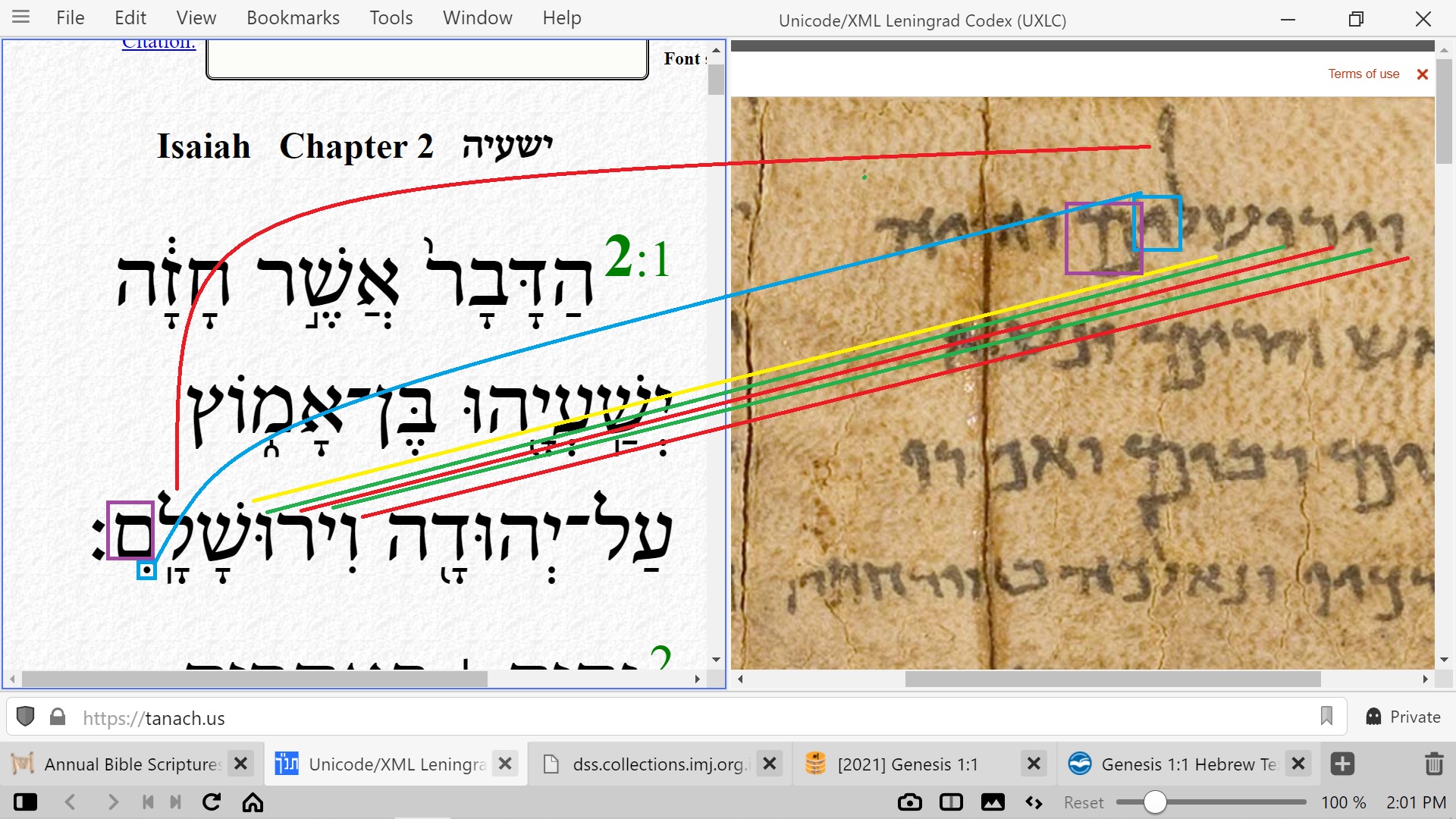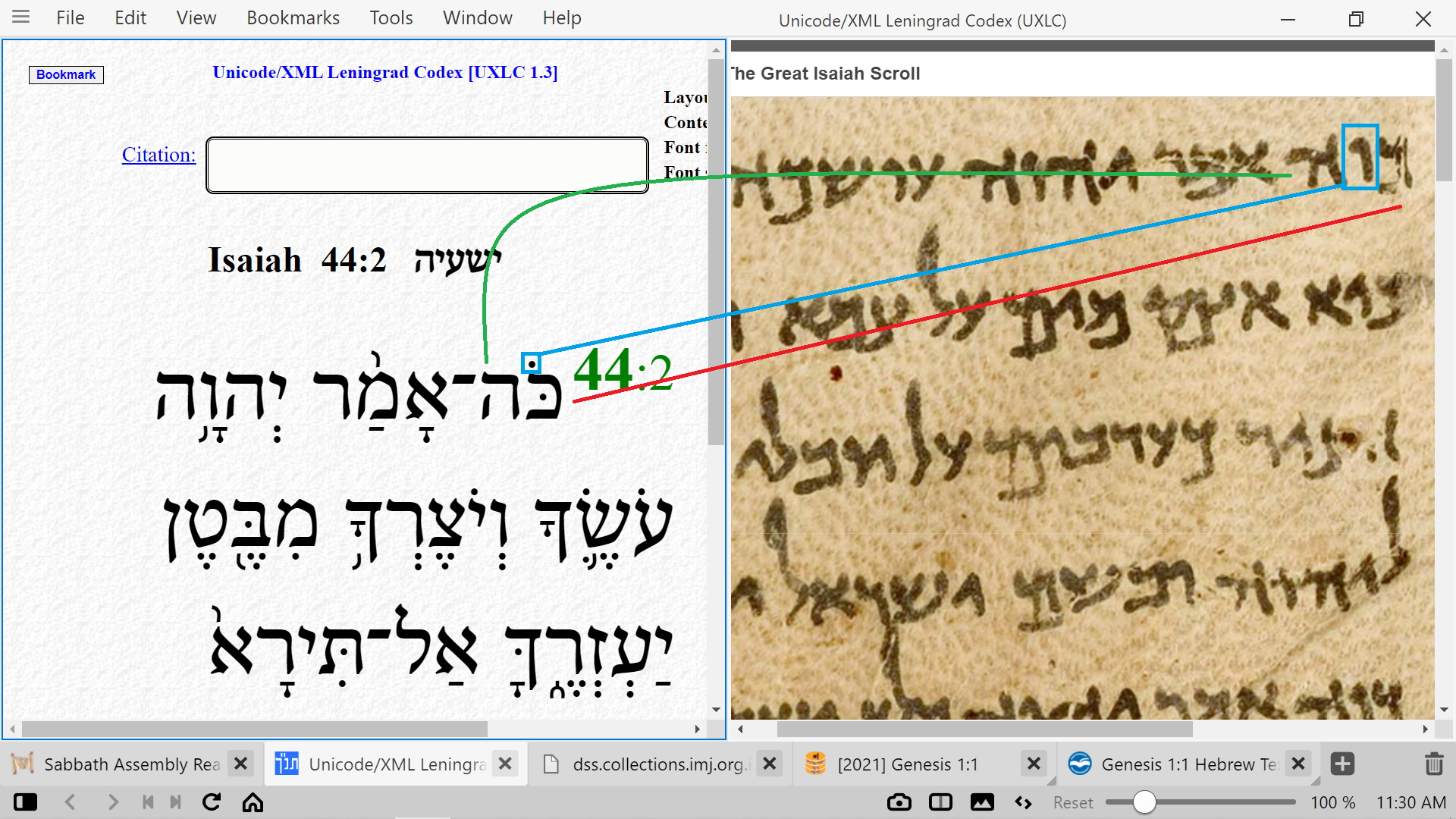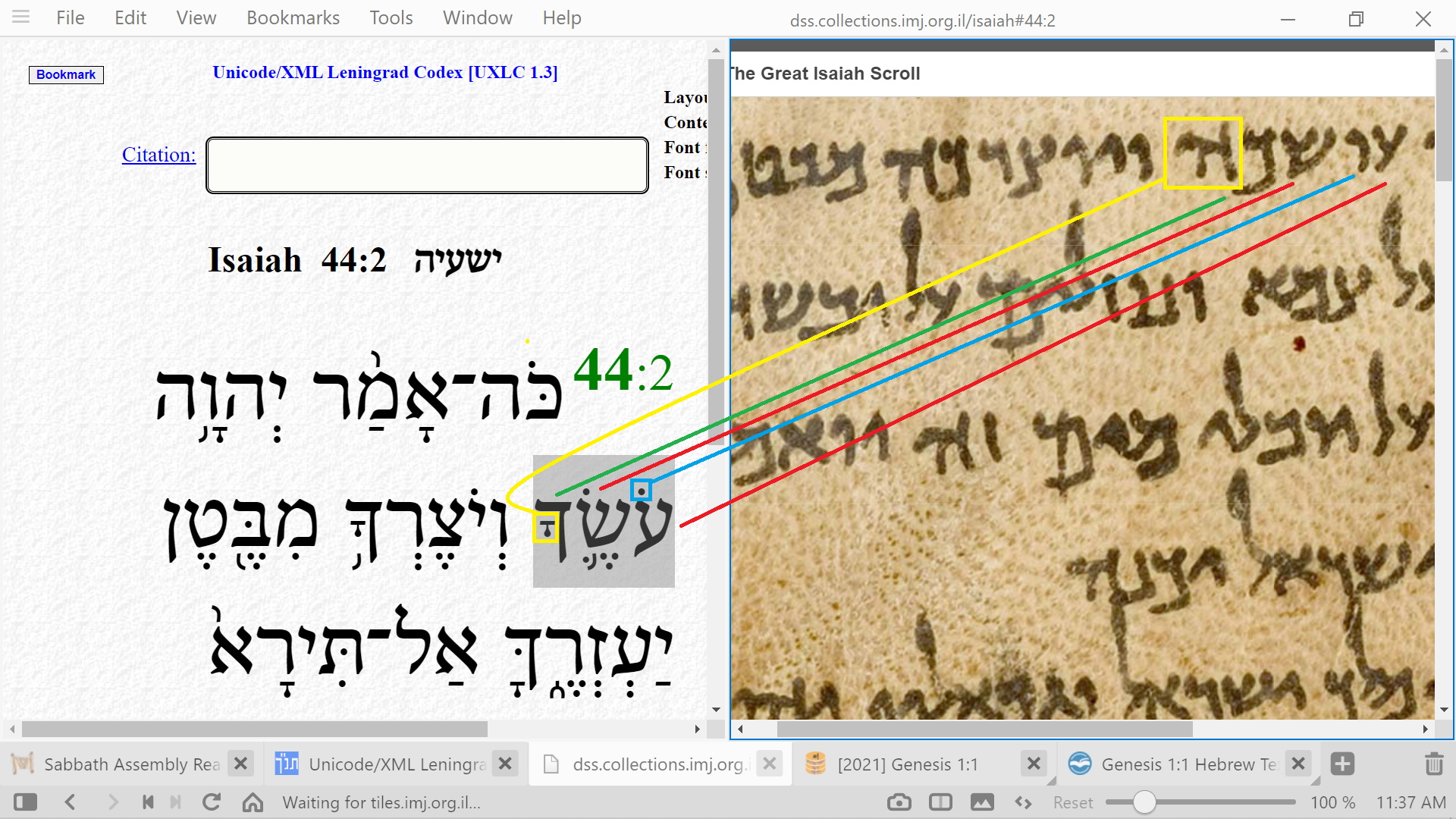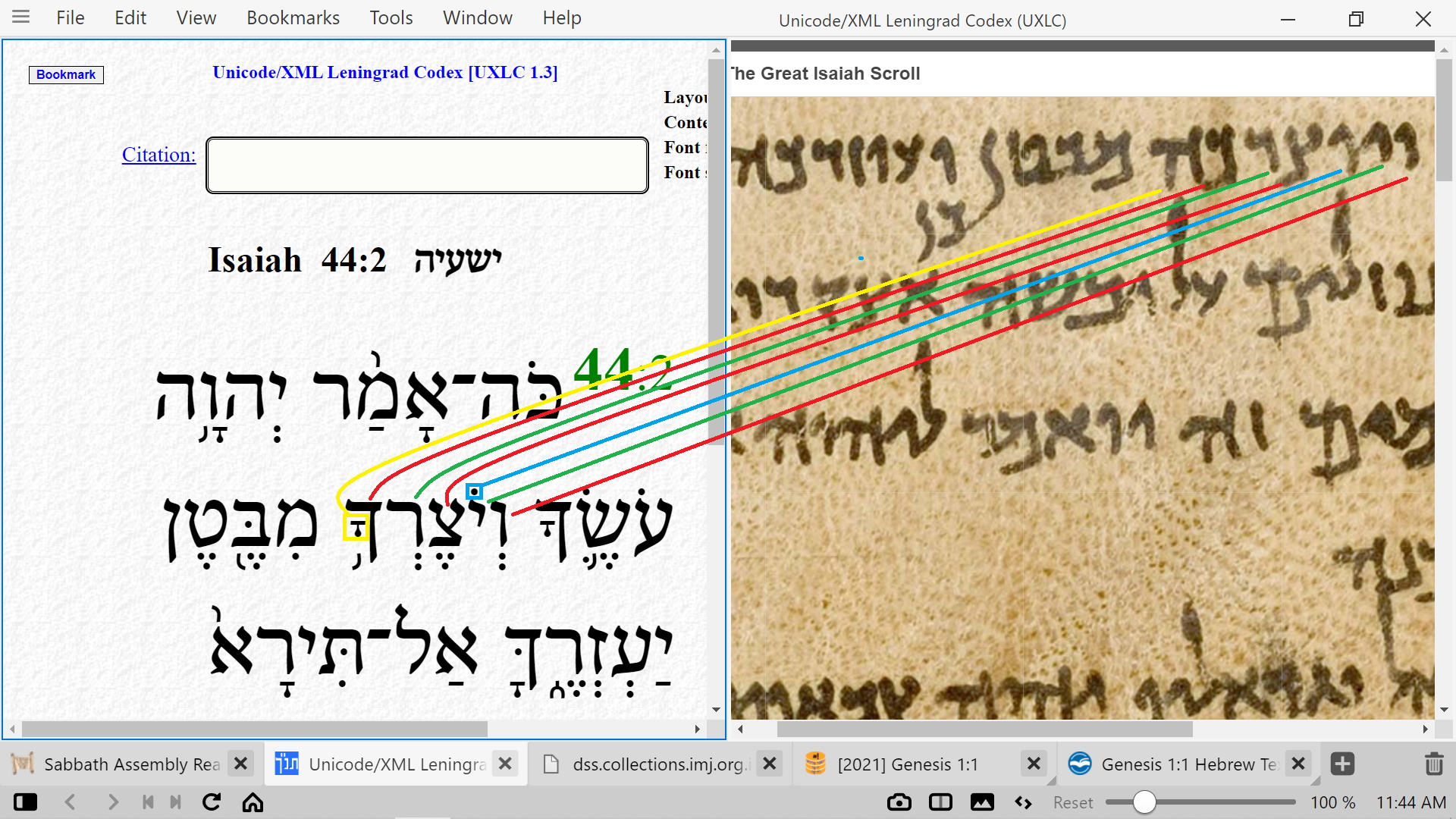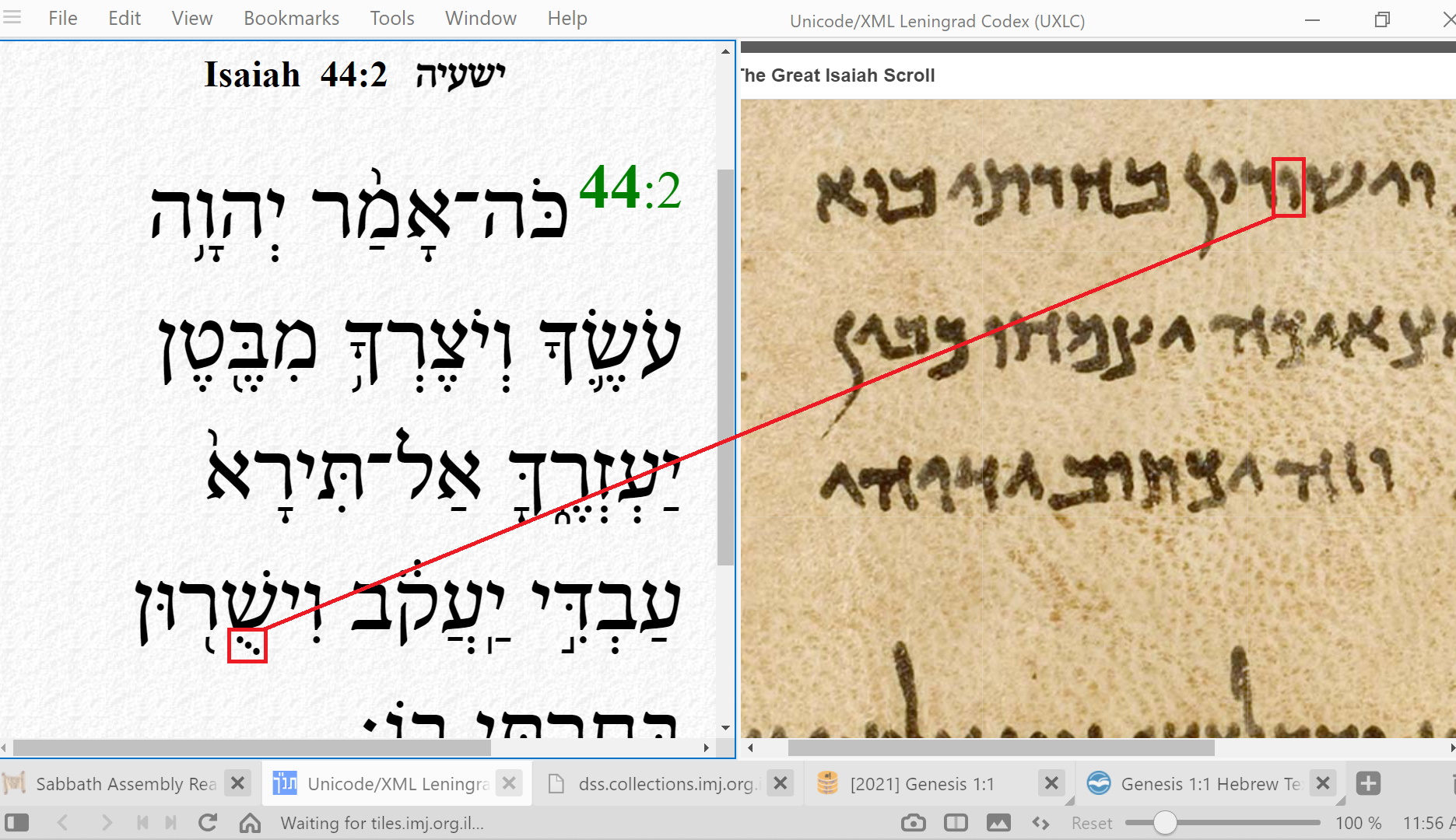Proving The "Shua" In "Yahushua"
Originally Written: 2021-11-26 - Last Updated: 2024-07-01 - Video Recorded: 2021-11-20 & Additional Parts Recorded: 2021-11-27 & 2021-12-18

Messianic Prophesy Revealed
When you look at Zechariah 3:8 and Zechariah 6:11-13, does your Bible say, "Jesus" or "Joshua"? Did you know that Zechariah 3:8 and Zechariah 6:11-13 are messianic prophesies about the coming Messiah, that His Name would be "Yahushua"? Due to hundreds of years of incorrect English traditions, most Christians have not realized this yet - that the name of Christ is prophesied to be "Yahushua", because they think the names "Joshua" and "Jesus" are somehow supposed to be written as "Joshua" and "Jesus", instead of the exact same way - Yahushua. It's time to uncover the truth.
Differing Views on Hebrew Name Pronunciation & Writing
There are many views on the pronunciation or the way of writing the Son of our Creator's name. It is easy to show that His name was never "Jesus" - that is a misunderstanding based on incorrect traditions in the earliest English Bibles that many translators incorrectly continue to follow today. However, even amongst those who have correctly recognized that the Name of the Anointed is a Hebrew Name, there are still different views.
It is a well-established fact based on Acts 7:45 and Hebrews 4:8 that the Name of the Son of our Creator, the Anointed One, that His Name is identical to the man known in most English Bibles as "Joshua" from the Old Testament. The truth is, although most Bibles say "Joshua" and "Jesus", these names should not be written differently and are identical in the original Biblical manuscripts. That's why the King James translators called the "Old Testament Joshua" by the name Jesus in Acts 7:45 and Hebrews 4:8, whereas Bibles like the NIV and others have written "Joshua" instead. So which is it, is the Name of Christ, "Jesus", or "Joshua?". The answer is: neither. (Side Note: "Christ" means the "Anointed", just like "Christos", "Messiah", or "Mashiach" - they all mean the same thing.)
Does Your Name Mean Anything? Does Anyone's? Yes.
We would never argue that someone named "Enrique" has the name "Henry", or that a man named "Ricardo" is actually "Richard". In a court of law, if a witness is called, do you think names would matter then to get the facts correct? Yes. In a lottery drawing for a winner of a large sum of money, would anyone care if the winnings went to someone else with a "similar name" in a different language, but not correctly to them as the real winner? Yes. If your spouse called you by someone else's name when you were together, would names matter then? If you go to an interview with a CEO for a good job, would you try to respect the foreign-originated name of the CEO to get it right? Yes. So nobody in this society, in practice, actually believes in all sincerity that names don't matter. Everyone, in fact, acknowledges every day that names matter by all of these examples of how we live our life. We don't gloss over names of others, we respect them. Presidents, CEOs, and others who society consider "important" are known by their names. Why is it so hard then to consider that we should Honor the Names of the Father and Son? It is a simple concept. We just need to be consistent in our logic and reasoning the same we are with the rest of life.
In the 1st Century A.D., the Name people were baptizing in and casting out demons in was a Hebrew Name - not the same name that the King James translators chose to write into English. It is clear from researching that the name "Jesus" and "Joshua" both are incorrect and instead the name in Hebrew is known to start with a "Y" and end with an "A" and somewhere in between have an "sh" sound as well. We should not divide or be judgmental over this issue, but it is important to Honor the Father and the Son, and part of that is acknowledging, accepting, and using the Hebrew Name and not something we know is incorrect (such as the tradition known as "Jesus").
How To Witness About The Hebrew Names With Love
Amongst those who use the Hebrew Names for the Father and Son, there are many spectrums of views. Some people don't realize the importance of the Hebrew Name, and they only use it sparingly, believing that they must say "Jesus" so others understand them. This is incorrect because all we have to do is use the Hebrew Name and people will ask, many times, "Do you mean, 'Jesus'?, to which we can say, "Well, actually, I found out His real name is Yahushua. Jesus is more like an incorrect tradition and a misunderstanding. And actually, most names in the Bible are incorrect. 'Moses' is not really 'Moses' - he's 'Mosheh' - 'Isaiah' is 'YeshaYahu' - 'Jeremiah' was actually 'YirmeYahu', it wasn't 'Adam and Eve', it was "Adam and Chawwah".
When people realize we're not attacking their faith or judging them, and we're just pointing out what's true and accurate, they drop their guard and want to hear what you have to say; that's the whole point with giving people other examples from the Bible besides the name of "Jesus" being incorrect alone - so that they realize you aren't questioning their salvation as a believer, you're just trying to help them understand what's true and accurate and correct. It becomes a discussion of curiosity rather than a discussion of strife and tension, because you are viewed as revealing more truth to help them and educate them rather than bash them over the head and imply they're lost without hope and that all their personal experiences weren't real - when they really know inside they were real. So if you ignore their experience with the Father and don't recognize they are already saved, then your doctrine is viewed with skepticism because they can't deny what Yahweh has already done in their life. If you do, then they may question if you are from the Father.
If you treat them like they're the enemy, they will treat you like you're the enemy. But if you recognize they are another brother or sister who has just been taught incorrectly and you love them, then they will love you and listen to what you are sharing and many times want to know more. Division breeds division, and strife breeds strife, but choosing to assume they are a believer instead of an adversary makes a bridge for them to cross instead of a moat to throw a cannon-ball across. You can make them feel like they have to put on their battle gear to fight you, or you can just educate them about what's correct and accurate and maybe they'll open the Word and sit down beside you.
Claiming you must say, "Jesus", so people will understand you is without basis. If you called me "Fred", and I said, "Just so you know, my name is really 'Mike'.", would that be hard to understand? Not really. Pretty simple. We don't need to use the Name "Jesus" to teach anyone except to explain that "Jesus" wasn't His real name when they get curious by hearing us exclusively use the Hebrew Name to refer to the Son. Let them ask questions; don't assume they can't figure it out. They will figure it out. Just lead by example.
Examining The Different English Transliterations
Amongst those who recognize the importance of using the Hebrew Names for the Father and Son, the most common ways of writing or speaking the Son's Name include "Yeshua", "Yahshua", "Yehoshua", and "Yahushua"; but recently it has become increasingly popular to hear people say, "Yahusha" also. Here is a summary of all these different forms of the Name:
Yeshua
Yeshua - This is found in Nehemiah 8:17 spelled Yud/Yod, Shin, Waw, Ayin. The Masoretic vowels indicate a spelling of "Yeshua", or more exactly, "Yeishua", but some have speculated maybe it was spoken was "Yashua" in ancient times. This is not the longest form of His name and therefore I view this as an abbreviated form of His name and not the most ancient Hebrew form of His name.
Yahshua
Yahshua - Prior to 06/2024, I believed that this spelling was not found in the Hebrew anywhere, at all, and that it was merely a modern-day incorrect tradition that has gained lots of popularity but in reality simply was not found in the Hebrew. However, in 06/2024, while on a prayer phone conference call with other believers, I learned from someone who has been in this walk since before I was alive that they found, by using a Dead Sea Concordance resource, that the spelling Yod Heh Shin Waw Ayin is in fact in Scriptures in some places (7 I think they said?) in the Dead Sea Scrolls. I have not yet obtained the Dead Sea Manuscript pictures or concordance documents to prove this or see this for myself yet, and if this is shown to be incorrect, I will revert my answer for this spelling back to saying this is not found in Scriptures, but as of now (2024-07-01) I am considering this information credible enough to update this study pending further information that can support the statements about this new Dead Sea Scroll information I was not previously aware of. Apparently the Dead Sea Scrolls, in some cases for some scrolls or manuscripts, are tightly held and harder to get a hold of. I have confirmed that is correct information from multiple credible sources I know personally, one of them being the person who gave me the information about the Yod Heh Shin Waw Ayin spelling, and the other source being Jeff Benner of the Ancient Hebrew Research Center who is a friend of mine (although Jeff is not the one who tipped me off to the Yod Heh Shin Waw Ayin spelling). Related to this spelling, however, some have proposed that in the longer spelling, the first "U" or "O" in "Yahushua" or "Yehoshua" is silent - claiming that the letter Waw in that one specific instance is silent. There is simply no Hebrew evidence to suggest this that I am aware of. The letter Waw is either a "W", "O", or "U". The basis upon which they claim it is silent includes mentioning that the letter "Waw" is a "weak letter". Being weak doesn't mean being silent necessarily - the Aleph, Heh, and Yud/Yod are also "weak letters", yet that has nothing to do with whether or not a sound is associated with the other "weak letters" also found in the Name of Yahushua or the Father's name either. To single out one Waw here and claim it's silent is, seemingly, without any real basis, evidence, or reason. The most we can say is that it is a "belief" - but I haven't seen any convincing evidence that would prove it's a correct belief. Therefore, while the name written as "Yahshua" may be found in some Dead Sea Scroll verses, I still view this pronunciation as an abbreviated form of His name and not the most ancient Hebrew form.
Yehoshua
Yehoshua - This is common in the Hebrew and the letters for this come in two different forms in the Hebrew (see the below video for details). This spelling is based upon the Masoretic vowels we have today. Between approximately 700-1000 A.D., scribes made copies of the scrolls. In the process of doing this, some scribes began removing some letters in some places, and inserting vowel and accent marks that did not previously exist. A lot of people are taught that the scribes added vowel marks, so don't use them. The part that many people don't realize is that sometimes these vowels were actually to replace letters that previously existed. So, while the vowels did not exist in the Ancient Hebrew, we can't toss them out because the reality is that in some cases they are representing letters that did previously exist. However, we see inconsistencies with the name of the Father in the Hebrew regarding the Masoretic vowel marks. This brings doubt, therefore, into the mind about if we can trust the vowel marks regarding the Name of the Father YHWH (Yahweh) or any vowel marks in names of persons that are referencing a part of Yahweh's name (with the letters Yud/Yod. Heh, Waw). Any time the letters Yud/Yod Heh Waw appear, we question the accuracy, therefore, of the vowel marks. There is also other evidence cited on other websites that gives evidence that the vowels were not "Yeho" in ancient times, but we won't make that evidence our focus here. We do not believe the Masoretic vowels resulting in "Yeho" are correctly representing the most ancient way of speaking the name.
Yahushua
Yahushua - This is common in the Hebrew and the letters for this come in two different forms in the Hebrew (see the below video for details). This includes the same Hebrew letters as "Yehoshua" except this spelling is based on a belief that the Masoretic vowels resulting in "Yeho" are wrong, and instead the Masoretic scribes should have used vowels to result in "Yahu" instead for the start of the Name of "Yahushua" and other names starting with Yud/Yod, Heh, Waw in Hebrew. This also would match the "Yah" in the Hebrew word "HalleluYah" found in many places and the "Yahu" at the end of names ending with Yud/Yod, Heh, Waw, which are also clearly names referencing the Name of Yahweh. Examples include: EliYahu, YeshaYahu, YirmeYahu, and many others. The vowel marks do indicate the Yud/Yod, Heh, Waw ending in those names is "Yahu" which matches also the "Yah" in HalleluYah and the "Yah" in places where the Father's Name in the shortest form is written as "Yah" according to the vowels, such as Psalms 68:4 (68:5 in the Hebrew), Exodus 17:16, and others. It seems inconsistent and incorrect that the Yud/Yod, Heh, Waw be "Yeho" in some places but "Yahu" in others since these are names referencing the Name of the Creator obviously in their meaning. The fact that the Masoretic vowels for the Father's Name are inconsistent resulting in "Yehwah" in Genesis 2:7 (and other places), but "Yehwih" in Genesis 15:2 (and other places) shows that there is something incorrect and wrong going on with the Masoretic vowels which we disagree with. We do not believe the Father's name should be written two different ways, so this brings into question the legitimacy of trusting the Masoretic vowels for accurate writing and reading of the Hebrew Name of the Father as well as giving reason to distrust the "Yeho" beginning when we see clearly the word "HalleluYah" has "Yah" and names ending with "Yahu" as well. We do not entirely discount the Masoretic vowels altogether, and in fact to do so is a modern-day fallacy that is becoming popular. However, in regards specifically to the Father's Name and names referring to the Father's Name with Yud/Yod, Heh, Waw, we feel this is sufficient evidence to not rely on the Masoretic vowels in these specific cases only.
Yahoshua
Yahoshua - This is from the same letters as the spelling Yahushua except the belief is held by some who believe the first Waw functions as an "O" and not a "U". I consider it possible, but less likely, that this could be the correct pronunciation also. The reason I believe it's less likely is because the ending of names like with "Yahu" like "EliYahu" makes me think that Yod Heh Waw when referencing Yahweh's name are supposed to sound like "Yahu" when put at the start of a name also, not just the end. That belief might be wrong, however, and is merely a guess on my part. If I were going to pick a 2nd possible likely name to be the most ancient Hebrew form, this would come in 2nd as my 2nd best guess as to the Name in the most ancient Hebrew form, with Yahushua being my 1st guess of the most ancient Hebrew form. I believe the use of the "O" for the first Waw came later as a tradition, partly because we see the vowel points in "Yehoshua" contain an "O" and it makes me think the "O" is part of incorrectly modifying vowels associated with Yahweh's name since the vowel marks for Yahweh's name itself are not consistent. That inconsistency with the Father's name makes me believe that inconsistencies with parts of His name showing in other person's names are possibly due to the same incorrect reasons. So I tend to believe the ending of names with "Yahu" like "EliYahu" is the evidence of the original pronunciation of any Yod Heh Waw part of any name that refers to part of Yahweh's name, regardless if it is at the start or end of the name.
Yahusha
Yahusha - This spelling is becoming increasingly popular today, but is disproven by the below video (in our opinion). The Masoretic scribes removed letters and in some cases replaced those letters with vowel points; therefore, vowel points can't just be discarded as if they don't matter. The most ancient form of the spelling of the Name of Yahushua is Yud/Yod, Heh, Waw, Shin, Waw, Ayin. This longest, most ancient spelling, was retained (perhaps by accident?) by the scribes failing to remove the second Waw in two places: in Deuteronomy 3:21 and Judges 2:7. Watch the below video for a detailed explanation of this. We do not believe this pronunciation is correct because of this more ancient spelling with an additional Waw.
Dead Sea Scrolls Letters Converted To Vowels
As mentioned and shown in the above video, letters from the Dead Sea Scrolls were sometimes converted into Masoretic vowel points (niqqud / nikkud). So it is a major mistake when believers claim you should ignore the vowel points because they were added and not in the Ancient Hebrew. It's true - the Masoretic vowels were added; but it's also true that in some cases the vowels replaced letters that previously existed but were dropped off and converted into vowel marks essentially.
I've seen the evidence of this multiple times in passing in my own studies, and the above video and the below screenshot illustrate this. In the below screenshot, you see the Yud / Yod with a blue square around it in the Dead Sea Scrolls links to a Masoretic vowel point in the Masoretic text on the left. The Hebrew on the right is the Dead Sea Scrolls and the Hebrew on the left is the Westminster Leningrad Codex - one of the Masoretic texts in Isaiah 2:1. If you're confused, watch the above video where I explain this below screenshot. In addition, if you continue to scroll down, you will see other pictures from Isaiah 44:2 which are also explained in the above video as well, showing where Hebrew letters from the Dead Sea Scrolls have been replaced by Masoretic vowel points. Therefore, it is a mistake when people teach to throw out the vowel points, and you cannot throw out the vowel points!
